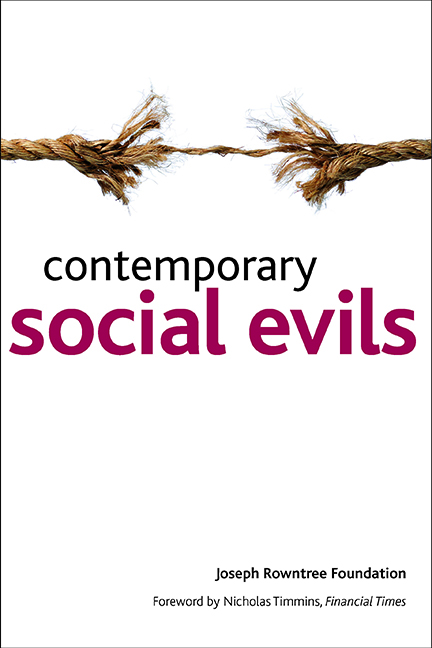Book contents
- Frontmatter
- Contents
- Foreword
- Acknowledgements
- Notes on contributors
- 1 Introduction
- 2 ‘Social evils’ and ‘social problems’ in Britain since 1904
- Section 1 Public Voices
- Section 2 Viewpoints
- A decline of values
- Distrust
- The absence of society
- Individualism
- Inequality
- Section 3 Reflections
- Appendix: How the ‘social evils’ consultations were organised
- Index
Foreword
Published online by Cambridge University Press: 26 January 2022
- Frontmatter
- Contents
- Foreword
- Acknowledgements
- Notes on contributors
- 1 Introduction
- 2 ‘Social evils’ and ‘social problems’ in Britain since 1904
- Section 1 Public Voices
- Section 2 Viewpoints
- A decline of values
- Distrust
- The absence of society
- Individualism
- Inequality
- Section 3 Reflections
- Appendix: How the ‘social evils’ consultations were organised
- Index
Summary
History is littered with exhortations from the great and the good to the aspiring to go out and solve problems.
Forty years before he wrote the report that bears his name, William Beveridge was urged by Edward Caird, the Master of Balliol, to go forth ‘and discover why, with so much wealth in Britain, there continues to be so much poverty, and how poverty can be cured’ (Beveridge, 1953, p 9).
The Joseph Rowntree Foundation (JRF), in setting up the trusts that bear his name, charged them with an even broader remit: to seek out the underlying causes of weakness in society. And it is that duty that has led JRF to re-examine, perhaps redefine, the ‘social evils’ that need to be tackled a hundred years on.
This book, the results of thousands of contributions from normally unheard voices to those of some of the country's most distinguished social commentators, is the outcome and it is challenging, stimulating reading.
For a country in which religious observation is now a minority sport, the use of the word ‘evil’ packs a powerful, even disturbing, punch. But from the online consultation and some of the contributions to this book, concerns about the decline of community and family (or at the least, its rapidly changing nature), and worries about rampant individualism, consumerism and a loss of solidarity emerge strongly.
One needs a degree of caution in analysing this.
Opinion polling regularly reveals a sense of pessimism about the present in the British character. Whether one is thinking of society as a whole, or the state of public services for example, Britons tend instinctively to believe in a ‘better yesterday’, even in the face of the facts – and even if (depending on economic circumstances) they may still believe that a better tomorrow is possible, or even likely. After all, it was in the 1950s – now seen by some as an ideal time of social cohesion, if by others as a period of social repression – when the composer and lyricist Lionel Bart struck a powerful chord, although admittedly a humorous one, with ‘Fings ain't what they used to be’.
- Type
- Chapter
- Information
- Contemporary Social Evils , pp. v - viPublisher: Bristol University PressPrint publication year: 2009



